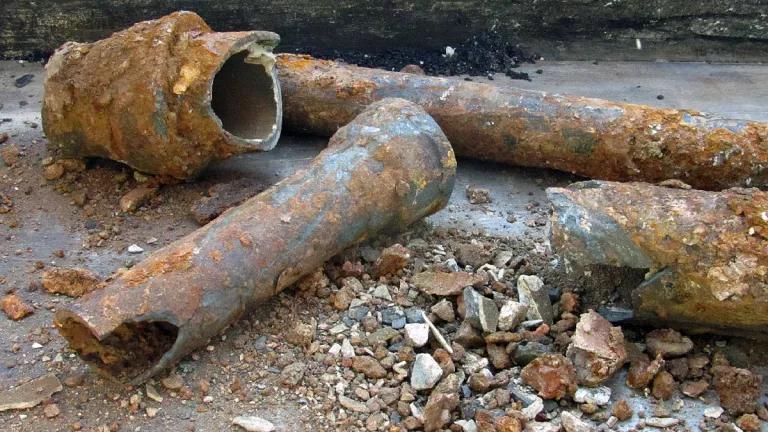Groups Announce Intent to Sue for Lead in Drinking Water
Newark, New Jersey's drinking water lead levels are among the highest recorded by a large water system in the United States in recent years.

Newark, New Jersey
NRDC, together with the Newark Education Workers Caucus (NEW Caucus), a group of educators who teach in Newark’s public schools, today announced our intent to sue State and City officials for ongoing violations of the federal Safe Drinking Water Act. The City of Newark’s drinking water lead levels are among the highest recorded by a large water system in the United States in recent years.
The City of Newark’s high lead levels in drinking water are especially concerning because they compound long-standing community concerns about children’s exposure to toxic levels of lead. For years, Newark has had the greatest number of lead-poisoned children in New Jersey, while in 2016 the school district struggled to get funding from the State to install filters after testing revealed 30 public schools with elevated water lead levels.
Lead Levels in Newark
In 2017, across the water system, more than 10 percent of samples collected by the Newark Water Department showed lead levels in excess of 26 parts per billion—nearly twice the federal action level. Approximately 20 percent of samples exceeded the federal action level overall, with some individual sampling locations jumping to three and even nine times higher. The trend has continued into 2018, with samples above the action level occurring in February, March, and April so far.
“This is a serious violation of the public trust. I’m concerned about my health and what this exposure means for my students, since even low levels of lead can impair children’s brain development,” said Yvette Jordan, a Newark resident and member of NEW Caucus. “It’s urgent that the City do more to ensure that when Newark’s residents take a drink of water, we aren’t sipping toxic lead.”
The City of Newark has received two notices of noncompliance with the Lead and Copper Rule from the New Jersey Department of Environmental Protection (NJDEP). The first came in July 2017 and states that between January and June 2017, Newark exceeded the 15 parts per billion federal action level for lead in drinking water. On January 23, 2018, the NJDEP issued a second notice of non-compliance, which states that between July and December 2017, Newark again exceeded the action level.
“It’s unacceptable that City and State officials would consider providing billions of dollars in tax breaks to welcome corporations to Newark, while failing to address health-threatening infrastructure issues like this for its residents,” added Al Moussab, a resident of Newark and the President of NEW Caucus.
Notice of Intent to Sue Claims
Our notice of intent to sue alleges that the City of Newark is violating the Lead and Copper Rule in five ways:
- By impermissibly sampling lower-priority sites that are less likely to have high lead concentrations to reach its 100-sample quota in each monitoring period. This is likely masking the extent of the lead crisis.
- By failing to meet a 1997 deadline for installing “optimal corrosion control treatment.” Optimal corrosion control treatment is intended to minimize lead levels at users’ water taps, and is often accomplished by adding chemicals to the water to prevent corrosion.
- By failing to maintain optimal corrosion control treatment. Maintaining optimal corrosion control means minimizing lead concentrations in the drinking water to the maximum extent feasible. In its notices of noncompliance after the City of Newark’s action level exceedences, NJDEP found that the Newark Water Department is not complying with this requirement.
- By not providing each water system customer with printed materials containing information about the health effects of lead and how to get their water tested. The City of Newark is required to notify each bill-paying customer when it exceeds the lead action level in a monitoring period.
- By failing to complete an evaluation of the materials used in Newark’s water distribution system, including identifying the locations of its lead service lines, in order to inform the City's monitoring for lead and other contaminants.
Our notice of intent to sue also alleges that the Acting Commissioner of NJDEP is violating the Lead and Copper Rule in two ways:
- By failing to meet a 1995 deadline for approving optimal corrosion control treatment proposed by the water system or designating its own treatment plan for Newark, and providing written notice of its determination.
- By not establishing “optimal water quality parameters” for Newark. Optimal water quality parameters provide values for water quality indicators, such as pH level and different chemicals added to the water, and are used to measure whether a system is effectively operating its corrosion control treatment.
This notice is required under the Safe Drinking Water Act, and gives State and City officials 60 days to fix the violations we have alleged before NRDC and NEW Caucus will file a lawsuit.
Lead in Drinking Water
Lead exposure is a critical environmental health issue and experts agree that there is no safe level of lead exposure. Lead is a heavy metal that can find its way into drinking water when it dissolves or comes off in flakes from lead pipes and plumbing fixtures, especially when the pipes are old or the water is corrosive.
Pregnant women and children are especially vulnerable; even low levels of lead are associated with serious, irreversible damage to children’s developing brains and nervous systems. Exposure to lead is also associated with miscarriages in pregnant women, as well as fertility problems, adverse cardiovascular and kidney effects, cognitive dysfunction, and elevated blood pressure in otherwise healthy adults.
The Safe Drinking Water Act
In 1974, the U.S. Congress enacted the Safe Drinking Water Act to protect public water systems throughout the country. The Safe Drinking Water Act requires the U.S. Environmental Protection Agency (EPA) to establish and enforce standards for public drinking water systems, including maximum contaminant levels or treatment techniques, and monitoring and reporting requirements.
Pursuant to that mandate, the EPA created the Lead and Copper Rule in 1991. The Lead and Copper Rule requires every public water system to comply with certain requirements to control the leaching of lead from pipes, including sampling and treating the water to prevent corrosion.
The Lead and Copper Rule also sets a federal action level for lead at 15 parts per billion. A water system exceeds the action level if more than ten percent of samples collected during a monitoring period have concentrations above 15 parts per billion. Exceeding the action level triggers additional requirements for the water system, including public education measures and replacement of lead service lines in the water distribution system.
The EPA delegates primary enforcement responsibility for public water systems to states if they meet certain requirements. NJDEP administers New Jersey’s program through the State’s Safe Drinking Water Act Rules “for the purpose of ensuring the provision of safe drinking water to consumers, and enabling [NJDEP] to assume primary enforcement responsibility under the Federal Safe Drinking Water Act.”




